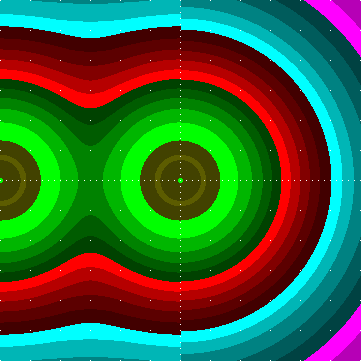



|

|

|
| In left plots, specific illuminances by a continuous row of luminaires spaced 5 and 6 heights are shown in their left halves (right half concerns a single luminaire). | The right plot is for a single luminaire, unrotated. | |

Values below the scale are illuminance / 1 lx. This is for (unrealistic) “unit” case that luminaires would have lamps producing 1 klm only, would be point-like and just 1 m over the terrain.
# IESNA:LM-63-1995
# [TEST] 767815
# [DATE] 8/13/97
# [MANUFAC] COOPER LIGHTING
# [LUMCAT] GMX40MXXARFG
# [LUMINAIRE] 400MH TYPE III VERTICAL AREA
# [LAMP] 400W MH CL ED-37
# [_REFLECTOR] SPUN AND STAMPED ALUMINUM
# [_REFRACTOR] FLAT GLASS
# [_SOCKET POSITION] VERTICAL BASE UP
# [_LAMP LUMENS] 36000
# TILT=NONE
# Bulbs: 1, 36000 lm each
# Number of measured angles: 37 vertical, 1 horizontal ones
# Photometric type: 1, Units type: 1
# Luminous openig width, length and height: 0.000 0.000 0.000
# Ballast factor: 1, Input power: 400 W
# Source file: gmx4marfg.ies
# Luminaire flux = 24330 lm,
# 67.6 % of the bulb flux
# between 75 and 90: 6.1 % of the luminaire flux
# - this part causes just GLARE in case of road lighting and similar purposes
# 80deg and above: max 26.9 cd / 1000 lm , 1.1 % of the luminaire flux
# 90deg and above: max 0.4?cd / 1000 lm , 0.0?% of the luminaire flux
# CutOff Type: Full_CutOff
# 62.5 deg to <67.5 deg: max 218 cd / 1000 lm,
# 67.5 deg to < 76 deg: max 218 cd / 1000 lm,
# maximum spec. lum. intensity 218 cd / 1000 lm
# The following table gives luminous intensities which would be produced
# using a hypothetic bulb giving a luminous flux of 1000 lm (i.e., cd/klm):
0.0 27.1
2.5 29.7
5.0 32.6
7.5 36.3
10.0 40.7
12.5 45.7
15.0 50.8
17.5 54.5
20.0 56.3
22.5 56.4
25.0 58.4
27.5 63.0
30.0 70.4
32.5 80.8
35.0 92.7
37.5 104
40.0 113
42.5 121
45.0 128
47.5 134
50.0 141
52.5 144
55.0 153
57.5 172
60.0 190
62.5 205
65.0 218
67.5 218
70.0 199
72.5 156
75.0 107
77.5 59.1
80.0 26.9
82.5 10.5
85.0 3.9
87.5 1.0
90.0 0.4